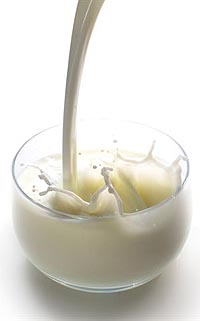Why You Shouldn’t Ditch Dairy
When Dieting

Dairy produce can be high in fat, especially saturated fat, so it’s one of the first things many women cut out when trying to watch their weight. But milk, cheese and yogurt are a great source of calcium, which strengthens your bones, and while it’s possible to get the vital mineral from other foods, such as green leafy vegetables and canned fish, if you cut out dairy altogether it can be much more difficult to meet your daily calcium requirement of 700mg.
After the menopause, your calcium requirements rise to 1,400mg per day, a tough target to hit if you ditch the white stuff. The majority of women in a recent study in the US underestimated their daily calcium needs by at least half and the same study found that a staggering 75 percent of Americans were calcium deficient. And having enough calcium in your diet can actually help you lose weight.
Researchers at Purdue University in Indiana found that young, normal weight women who had 1,000mg of calcium every day — the amount of calcium found in about 1˝ pints of semi-skimmed milk — lost about 6lb over two years.
Similar results have been found in other studies, too. Leading calcium expert, Dr Michael Zemel and colleagues, analysed the diets of 32 obese adults and discovered that those people eating three servings of low-fat dairy products a day lost more than 10% of their body weight. In contrast, those taking calcium supplements or those who had little calcium or dairy in their diet lost only 8% and 6% of their body weight, respectively. Apparently, dairy allows one to feel fuller and more satisfied longer, leading to less calorie consumption.
The Solution
Consequently, don’t be tempted to ditch the dairy and instead make sure you include low-fat products in your diet. One pint of milk provides approximately 700mg of calcium, but very few of us drink a whole pint every day. So aim for a variety of low-fat dairy foods and try to have 2-3 portions each day. A matchbox-size chunk of cheese, one 5fl oz yogurt and 1/3 pint of milk would be enough to hit your daily calcium target. Choose skimmed or semi-skimmed milk and avoid cream. Aim for a moderate-fat yogurt (4-5g fat per pot) rather than “fat-free” varieties (where the fat is often just replaced with sugar). If you don’t consume dairy foods at all, try fortified juice, rice or soya milk and consult a dietician for advice.
Vitamin D is also essential for the absorption of calcium and is made by the body when exposed to daylight; so try to get outside or let sun shine through your window for at least ten minutes each day for your daily dose.
|